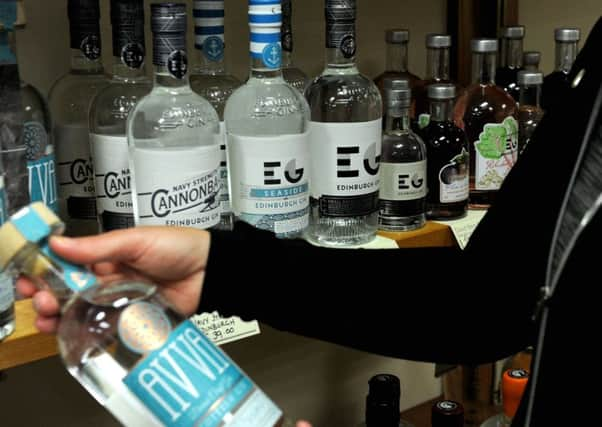Jim Duffy: Gin and bear it as entrepreneurs eye white spirit


It always seemed a quintessentially English tipple aligned with Beefeaters and the like. It was always a favourite in the business cabins of many airlines.
One drank gin and tonic if one was a wee bit posh. Otherwise it was vodka and Irn-Bru or Bacardi and Coke. How very stereotypical. But gin has had quite a renaissance recently.
• READ MORE: Why has gin become so popular?
Advertisement
Hide AdAdvertisement
Hide AdThere are more than 50 gin distilleries in Scotland and hundreds in the UK as a whole. Official figures from HM Revenue & Customs show there were 233 licensed UK gin producers by the end of 2015 alone.
It is safe to say it is a trending space for many food and drink business entrepreneurs. There’s almost not a city in the UK that does not have a gin named after it. But, despite all this new choice, there is one abiding question that always nags at me: why are we paying so much for a bottle of gin?
That’s right, gin is one of the simplest alcoholic spirits to manufacture and produce. But we are being charged the same price as a 12-year-old malt.
Producing gin is pretty straightforward. The ingredients are not expensive. If I’m not mistaken it used to be made in many a home as “bath tub gin”. Starting with a neutral grain spirit, add your juniper, your citrus and whatever flavourings you like and hey presto, there you are.
I’m hyperbolising of course as it take a bit more skill that this. But instantly one has a gin that is ready to consume. Compare and contrast this with the distillation and storage for 12 years of whisky, then it would appear that the gin distillers are taking liberties with their pricing.
If you have ever visited a whisky distillery, then you will know that the spirit being made and put into barrels that day will not be consumed for, say, 12 years. It’s an amazing experience as the tour continues and you see barrels that will mature in ten, nine, eight years and so on.
This takes time and money and operating cost. So, therefore I would expect a bottle of 12-year-old malt whisky to certainly cost say £25-£30. There are some amazing malt whiskies out there and at that price point, it is fair to say that they are not just works of art, but true bargains. So, why has gin that has been made in a day commanding the same premium?
Advertisement
Hide AdAdvertisement
Hide AdIs it simply the age-old story of it being a big old marketing game? Gin is a basic spirit and perhaps had a bad reputation many years ago with the “bath tub” handle. So, connecting it with royalty and London with the branding of London Dry gin was very clever and imbues tones of wealth, class and quality. Albeit gin was initially imported from Europe and the Dutch. Hence the term Dutch courage!
And now we have locational gins sprouting up everywhere. I did a Google search of the UK and the places that now have a gin named after them range from Edinburgh, Harris, Orkney and Portobello Road to Brighton, Plymouth, the Cotswolds, Liverpool and Berkeley Square. So what sets them all apart if the basics are simple enough? Apart from a few tweaks here and there, not much. Plymouth gin is my personal favourite as it has an orange hue and works really well with a slice of orange instead of lemon or lime.
But, in essence it’s just an essence – right? The high prices that gin producers are commanding is no doubt down to clever marketing and fair play to them if they can convince you to part with your cash when confronted with 30 gins to choose from in the local supermarket.
But there is some common sense creeping into the gin market as the low-cost supermarkets stock cheaper versions that are even “out tasting” bigger brands with bigger marketing budgets. Aldi’s £10 gin has been ranked one of the best in the world it seems. I think the gin market is set for a big correction and that might just be a tonic.
• Jim Duffy is co-founder of The Moonshot Academy and author of Create Special